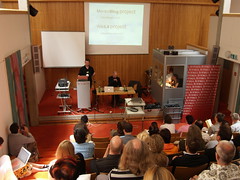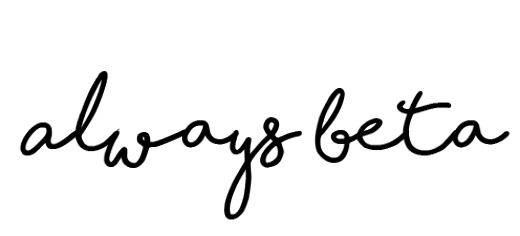It was my first Educational Conference I attended as usual visitor. The location St. Virgil in Salzburg was very useful. The Wifi was a little bit weak some times (as Martin already mentioned) and it seems that the eInfrastructure is more important than one thinks sometimes. A lot of the participants where hunting sockets, especially close to the rooms where the sessions took place. Even more important were the Tracks, Forums and Keynotes and I want to sum up my Impressions.
ePortfolio Expert Forum
-
First John Pallister [Blog] told about his experences in the MOSEP Project and with ePrtfolios in general. After his presentation he asked what our status concerning ePortfolios is yet.
His answer is:
The ePortfolio process supports a shift from teaching to learning;
We are not taking full advantage of the process yet – why not? You will find his presentation in a ePortfolio Google Group. (Note even thoug the presentation has 54 slides he only used the first 14 during his speech. Thank you 😉 ) - Thomas Pfeffer (University of Klagenfurt) were talking about Competence Portfolios and Portfolios for Assesment.
- Sieglinde Jakob-Kühn talked about frustrating Experiences with Mahara within the MOSEP Project. As i heard later it was caused by the update from Mahara 0.8 to Version 1.0.
- The last presentation inside this forum was done by Andrea Chrsiten and Martin Hofmann pedagogical University St. Gallen. It dealt with reflecting portfolios and the possibilitis of development of the personality by doing ePortfolio Work. One example was Sarahs Portfolio.
After all that presentations (I hope they will be online soon) there had been a active discussion.
Keynotes
Within the Keynotes there had been the following things interesting for me:
- Graham Attwell of Pontydysgu was talking about the MOSEP Project and the Aims and Issues of ePortfolios.
Aims- Presentation
- Asessment
- Planning Aims
- Personal Learning
Issues
- Changes in teaching and learning
- Who provides te ePortfolio?
- Who can access the portfolio for what purpose?
- What should an e-portfolio contain?
- How do we represent and recognise informal learning
And he added a final statement which I think one should keep in mind when talking about assesment wit ePortfolios
Assesment for learning not assesment of learning.
- Another Keynote speaker was Jay Cross. I have to admit that some of his “effects” in the presentation were pretty smart, but alltogether it was’nt that impressing as expected.
Within his presentation he said learning is based on Comprehension, Conversation and Collaboration. -
The most interesting Keynote was offered in the beginning of the second conference day by Gabi Reinmann. She was talking about Selbstorganisation im Netz – Anstoß zum Hinterfragen impliziter Annahmen und Prämissen.
Abstract:When we talk about “self organization on the web†there is little reflection on the implicit presumptions which underlie discussions and recommendations for self-organized learning in Web 2.0. This article elaborates on three of these premises, namely: (a) It is largely clear what self-organization means. (b) Self-organization is possible for anybody anytime. (c) Self-organization is generally desired. The point is not to dismiss self-organized learning on the interactive web or to argue against the boom of self-organization in the public discourse per se. But there are reasons for advocating more transparency and some thoughtfulness.
It was one of the very few critical voices but still not strictly avoiding the new options. I really liked that! She was also one of the very few persons who offered her materials online yet. Thank you very much!
Some short things
Within a discussion and a Track Rolf Arnold said some interesting things:
- You can’t make people learning, earning can’t be forced.
- Technology is comfortable. You dont have to write down everything the teacher is saying, you don’t have to be in a specific place to “consume” you learning content.
and he asks an interesting question:
- New Media- New Education?
 And another interesting Session was hosted by Steve Wheeler. He was talking about open content and self organisation: using social software to promote collaborative learning. Three points leads him to use social software:
And another interesting Session was hosted by Steve Wheeler. He was talking about open content and self organisation: using social software to promote collaborative learning. Three points leads him to use social software:
- students should take responsibility for their own learning
- social software offers opportunities for deeper learning
- social software promotes reflective practice
He is working within two projects called Mentorblog & WikiLit Project.
That are the main things which managed their way to my notes. If i missunderstood something or if you have your own review (does’nt matter what langauge) please comment or trackback this post.
Update: EduMedia 2008 – from an ePortfolio and PLTs perspective John Pallsiters review

Thx for sharing, especially in English. Was nice talking to you, and great stuff you are twittering;-)
Hi Ralf, I’d like to comment on the ePortfolio expert forum and the presentation I held there.
The main issues I tried to make people aware of was not the minor problem we had with Mahara during the testing phase of MOSEP in Germany. And this was not due to any update or so, just the normal bugs you have to deal with when you are using an open source (but not only!!!) software.
What I wanted to say was that it is not enough to have an ePortfolio or to use any other web based tools for improving education. We have to change our attitude towards the way we are teaching and learning and for this we need more support from administration, school management but also more enhusiasm from teachers to change their teaching methods for more collaborative forms.
I am convinced that the method of using ePortfolios will contribute a lot on this long road of learning and reflection as well for students as for teachers.
Thank you for sharing your impressions of the EduMedia conference.